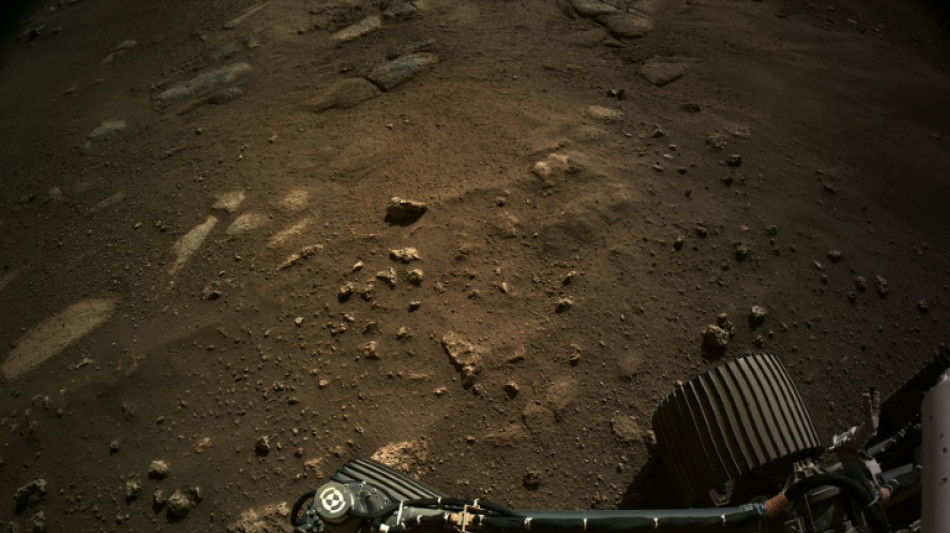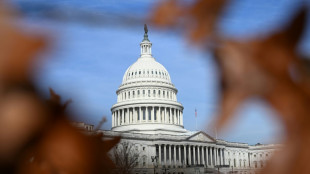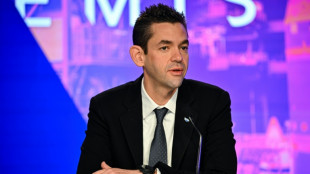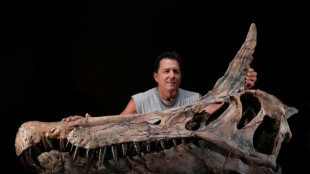
-
 Pakistan 'have underperformed' says Agha after T20 World Cup exit
Pakistan 'have underperformed' says Agha after T20 World Cup exit
-
Under-strength Toulouse overpower Montauban in Top 14

-
 Vietnam AI law takes effect, first in Southeast Asia
Vietnam AI law takes effect, first in Southeast Asia
-
Brazil's Lula visits flood zone as death toll from landslides hits 70

-
 New Zealand into T20 World Cup semis as Sri Lanka avoid big Pakistan loss
New Zealand into T20 World Cup semis as Sri Lanka avoid big Pakistan loss
-
Medvedev wins Dubai title as Griekspoor withdraws

-
 First Yamal hat-trick helps Liga leaders Barcelona beat Villarreal
First Yamal hat-trick helps Liga leaders Barcelona beat Villarreal
-
Liverpool hit five past West Ham, Haaland-less City face Leeds test

-
 Van der Poel romps to cobbled classic win
Van der Poel romps to cobbled classic win
-
Republicans back Trump, Democrats attack 'illegal' Iran war

-
 Madonna is surprise attraction at Dolce & Gabbana Milan show
Madonna is surprise attraction at Dolce & Gabbana Milan show
-
Farhan keeps Pakistan hopes alive as they post 212-8 against Sri Lanka

-
 Afghanistan says civilians killed in Pakistan air strikes
Afghanistan says civilians killed in Pakistan air strikes
-
Tug of war: how US presidents battle Congress for military powers

-
 Residents flee as Iran missiles stun peaceful Gulf cities
Residents flee as Iran missiles stun peaceful Gulf cities
-
Streets empty and shops close as US strikes confirm Iranian fears

-
 Israelis shelter underground as Iran fires missiles
Israelis shelter underground as Iran fires missiles
-
Bournemouth held by Sunderland in blow to European bid

-
 VAR expanded to include second bookings and corners for World Cup
VAR expanded to include second bookings and corners for World Cup
-
Iranians in Istanbul jittery but jubilant at US, Israeli strikes

-
 Congo-Brazzaville president vows to keep power as campaign kicks off
Congo-Brazzaville president vows to keep power as campaign kicks off
-
US, Israel launch strikes on Iran, Tehran hits back across region

-
 Germany's Aicher wins women's super-G in Soldeu
Germany's Aicher wins women's super-G in Soldeu
-
Fight against terror: Trump threatens Tehran's mullahs

-
 US and Israel launch strikes on Iran, explosions reported across region
US and Israel launch strikes on Iran, explosions reported across region
-
Iran's Khamenei: ruthless revolutionary at apex of Islamic republic

-
 In Iran attack, Trump seeks what he foreswore -- regime change
In Iran attack, Trump seeks what he foreswore -- regime change
-
Climate change forces facelift for Michelangelo masterpiece

-
 Trump says US aims to destroy Iran's military, topple government
Trump says US aims to destroy Iran's military, topple government
-
Acosta wins season-opening MotoGP sprint after Marquez penalty

-
 US and Israel launch strikes against Iran
US and Israel launch strikes against Iran
-
Afghanistan says Pakistan fighter jet down as cross-border strikes flare

-
 Kerr says only '85 percent' fit for Women's Asian Cup
Kerr says only '85 percent' fit for Women's Asian Cup
-
Messi's Inter Miami to visit White House: US media

-
 Thunder beat Nuggets in overtime on Gilgeous-Alexander's return
Thunder beat Nuggets in overtime on Gilgeous-Alexander's return
-
'It's surreal': Zimbabwe superfans revel in unexpected ride to India

-
 New 'Wuthering Heights' film unleashes fresh wave of Bronte-mania
New 'Wuthering Heights' film unleashes fresh wave of Bronte-mania
-
US backs Pakistan's 'right to defend itself' after strikes on Afghanistan

-
 Bezzecchi beats Marquez to pole at season-opening Thailand MotoGP
Bezzecchi beats Marquez to pole at season-opening Thailand MotoGP
-
OpenAI strikes Pentagon deal with 'safeguards' as Trump dumps Anthropic

-
 Oscar-nominated 'F1' sound engineers recreate roar of racetrack
Oscar-nominated 'F1' sound engineers recreate roar of racetrack
-
15 dead as cash-packed military plane crashes in Bolivia

-
 Costa Rica's Grynspan pledges reform in bid for UN chief job
Costa Rica's Grynspan pledges reform in bid for UN chief job
-
Former All Black Bridge hailed for influence at Western Force

-
 'Sinners' vampires inspired by animals, says Oscar hopeful makeup artist
'Sinners' vampires inspired by animals, says Oscar hopeful makeup artist
-
For Oscar nominee Stellan Skarsgard, good cinema is like slow food

-
 'Brilliant industry' sees Reds down Highlanders in Super Rugby
'Brilliant industry' sees Reds down Highlanders in Super Rugby
-
Neil Sedaka, US singer and songwriter, dies age 86

-
 New to The Street to Broadcast Executive Leadership Interviews Featuring Medicus Pharma Ltd. (NASDAQ:MDCX), CitroTech (NYSE:CITR), Vivos Therapeutics, Inc. (NASDAQ:VVOS), and Virtuix Holdings ($VTIX) on Bloomberg Television Tonight at 6:30 PM EST
New to The Street to Broadcast Executive Leadership Interviews Featuring Medicus Pharma Ltd. (NASDAQ:MDCX), CitroTech (NYSE:CITR), Vivos Therapeutics, Inc. (NASDAQ:VVOS), and Virtuix Holdings ($VTIX) on Bloomberg Television Tonight at 6:30 PM EST
-
Understanding Common Dental Issues That Develop Over Time in Richardson, TX


The promise and peril of a crewed Mars mission
A crewed mission to Mars would rank among the most complex and costly undertakings in human history -- and US President Donald Trump has vowed to make it a national priority.
That political momentum, coupled with SpaceX chief Elon Musk's zeal, has breathed new life into a cause long championed by Red Planet advocates -- even as major obstacles remain, including Trump and Musk's latest feud.
- Why go? -
As NASA writes in its Moon to Mars blueprint, "exploration of the cosmos remains a great calling for humanity."
A mission to Mars would pursue scientific objectives like determining whether Mars ever hosted life and charting the evolution of its surface, as well as answering broader space physics questions -- such as the history of the Sun through studying Martian soil.
Geopolitics also looms large, as Trump has pledged to "plant the American flag on the planet Mars and even far beyond," invoking the "unlimited promise of the American dream."
Critics, however, say cuts to NASA's science budget and the cancellation of key projects -- including the return of rock samples collected by the Perseverance rover -- are undermining the research mission.
"The purpose of exploration is not just to go somewhere," Nobel-winning astrophysicist John Mather told AFP. "This is not a tourist thing. This is a fundamental knowledge thing."
- Getting there -
Musk is betting SpaceX's future on Starship, the largest rocket ever built, despite fiery failures in its nine test flights.
He's aiming for an uncrewed launch by late 2026, timed with the next favorable Earth-Mars alignment.
But the timeline is widely seen as optimistic: Starship has yet to land its upper stage or demonstrate in-orbit refueling -- both essential for deep space travel.
Some experts believe the system is fundamentally sound, while others say it's too soon to judge.
"A lot of the pertinent and relevant technical information... is not known to us," Kurt Polzin, chief engineer for NASA's space nuclear propulsion project, told AFP.
He backs Nuclear Thermal Propulsion (NTP), which uses fission to heat hydrogen and generate thrust.
NTP delivers "a lot of power in a very small package," Polzin said, eliminating the need for orbital refueling or fuel production on Mars.
Astronauts would spend seven to nine months in a cramped spacecraft, exposed to intense space radiation beyond Earth's magnetosphere.
Ideas to improve radiation shielding range from passive methods, like using dense materials, to active concepts such as plasma fields that deflect radiation, while drugs are being developed to reduce cell damage.
Without a system to simulate gravity -- such as rotational spin -- crews would also need grueling exercise routines to counteract muscle and bone loss.
Mental health is another concern. Growing plants aboard -- more for morale than sustenance -- has proved beneficial on the ISS.
Communication delays further complicate matters.
On the station, real-time data has helped prevent an average of 1.7 potentially fatal incidents per year, said Erik Antonsen, chair of NASA's human systems risk board -- but such communication will not be possible en route to Mars.
- Life on Mars -
Once on the surface, the uncertainties grow.
Probes and rovers have found hints -- organic molecules, seasonal methane -- but no definitive signs of life. If it ever existed, it likely died out long ago.
Still, Earth's own "extremophiles" offer intriguing clues -- from fungi that harness Chernobyl's radiation for energy, to microbes that survived 500,000 years in frozen stasis.
"If they can survive here in extreme environments, we have every reason to suspect they can be on Mars," said NASA astrobiologist Jennifer Eigenbrode at the recent Humans to the Moon and Mars Summit.
And while NASA has decided nuclear fission will power surface operations, other choices -- from crop selection to habitat design -- remain open.
"Mars has a 24-hour, 39-minute day -- that small difference creates strain, increases stress, and reduces sleep quality," said Phnam Bagley, a space architect who designs for comfort and crew well-being -- critical factors in preventing conflict.
The first trip would be around 500 days on the surface, but long-term colonization raises deeper questions.
For instance, scientists don't yet know whether mammalian embryos can develop in low gravity -- or what childbirth on Mars would entail.
"I think it's really important to take that seriously," said NASA's Antonsen.
"Even if you don't plan on it happening, people are still going to have sex, and somebody might get pregnant. Then it becomes a medical issue."
Ch.Havering--AMWN


